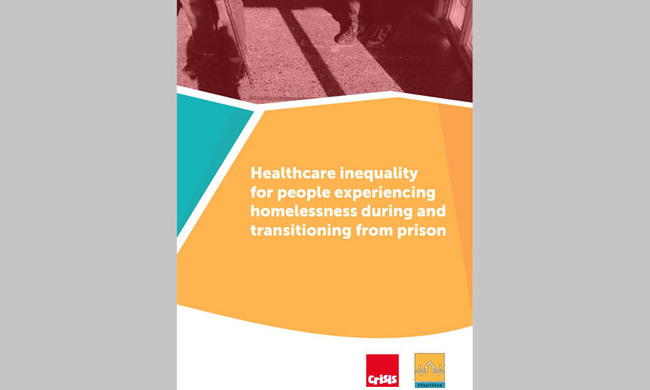Healthcare inequality for people experiencing homelessness during and transitioning from prison
06.03.2023
In Newcastle, from July 2021 to August 2022, three peer researchers put together a study that sought to better understand the experiences of healthcare for people in prison and as they return into the community, and how this connects to homelessness. The report was prepared in partnership with Groundswell as a part of the #HealthNow campaign.
Peer researchers interviewed 29 people with experiences of homelessness, who have been released from prison in the last four years. They aimed to explore:
- healthcare inequality for people experiencing homelessness during and transitioning from prison
- people’s experiences of healthcare inequality as they transition from prison into the community and into homelessness (including any form of temporary accommodation).
Key findings:
-
Healthcare before incarceration and during incarceration.
Most participants had an extensive range of physical and psychological health issues, often intertwined with substance use of drugs and alcohol before going into prison. These healthcare issues continued and often escalated in prison due to a lack of adequate treatment and support. Some respondents developed healthcare issues while in prison, which is linked to the prison environment and poor conditions.
-
Healthcare in prison.
Overall waiting to see healthcare professionals was too long and sometimes the appointments never occur. Serious conditions were often left untreated, whether this was through medication or holistic support or both. There were also issues with gaining medication and accessing the correct medication.
-
Acceptance of the inadequate system.
Many respondents reported giving up on seeking healthcare support because they knew there was no point in trying to get medication or support. This led to some participants self-medicating or learning how to treat their own aliments.
-
Lack of training and attitudes of healthcare staff (in the community and in prison) and correctional officers’ impact on responses and treatment.
A lack of correctional staff training resulted in their failure to provide an adequate or sympathetic response to the people with mental health needs. Participants felt stigmatised or labelled in relation to homelessness and past criminal behaviour. Some respondents felt healthcare staff abused their power and made decisions about who should get medication and support based on behaviour, favouritism, or a desire to dispense any medication with the aim of “keeping them quiet”.
-
Communication and information issues.
Issues with the passing of records from the community to prison, and prison back to community was identified by several participants. This impacted on gaining medication and treatment in prison and upon release.
-
Housing.
Physical and mental health difficulties, which often intersected with substance use of drugs and alcohol, alongside broader social inequalities such as a lack of financial security, were not considered before respondents were “resettled” into the community. This impacted on their ability to engage with healthcare services and other key organisations. Some respondents were released with no fixed abode, which had serious implications including rape and assaults. Many participants indicated they needed support to rebuild their lives, which included accessing healthcare. The difference effective support made is well highlighted. The findings point towards the need for holistic, individual, and integrated responses.
-
Wider issues have arguably impacted on people in prison and after leaving prison.
This includes poor conditions in prisons, cell sharing, professionals’ attitudes in prisons and the community, a lack of training, silo working, and the transfer of records and communication issues.
Based on the research, recommendations include:
- a timely improvement in the transfer of records from the community to prison and prison to community
- improved healthcare in prisons that takes account of complex needs and is based on these needs alone
- suitable housing and wrap around support that is arranged and provided prior to release
- training to improve the response by healthcare staff to avoid judgement and stigmatisation, particularly frontline staff
- policies and training to ensure the day-to-day running of the prison regime is conducted by correctional officers only, and healthcare is run by healthcare providers.
About #HealthNow
#HealthNow is a UK-wide campaign, working towards an inclusive health system where everyone has access to the healthcare they need and reducing their chances of homelessness.
The campaign is led by Groundswell and delivered in partnership with national charities Crisis and Shelter. In Newcastle, homelessness charity Crisis is responsible for delivering #HealthNow.
About peer researchers
The #HealthNow report was led by three researchers with experience of homelessness as part of Crisis’ Homelessness Health Peer Advocacy service, supporting people with experience of homelessness to help others access the healthcare they need.
Downloads

Download the PDF Healthcare report
Healthcare inequality for people experiencing homelessness during and transitioning from prison
